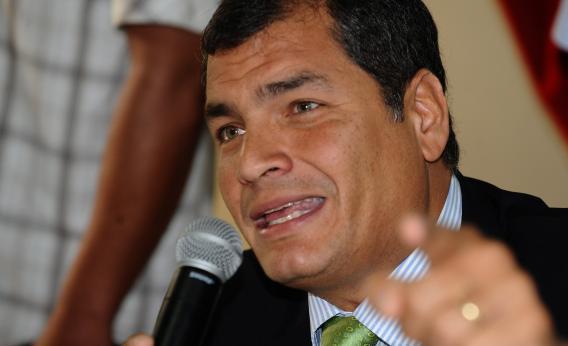The battle over Ecuador’s offer of asylum to WikiLeaks founder Julian Assange continues. The U.K. government remains firm in its stance that it will not permit Assange to leave the country, as he is facing extradition to Sweden for alleged sex crimes. On Thursday, British Foreign Secretary William Hague said that the diplomatic dispute could last several months.
One of the more puzzling aspects of this story has been Ecuador’s role. What is the small South American nation of about 14.5 million gaining from this? Assange is famous for his absolutist views regarding government transparency, freedom of speech, and Internet freedom. Does the Ecuadorian government share his perspective?
Many international observers see the asylum offer as a way to improve Ecuador’s image internationally and maybe needle the United States (which has been a primary target of WikiLeaks), the United Kingdom, and Sweden. Santiago Basabe of the Latin American Faculty of Social Sciences told the BBC, “By granting him asylum, the government was trying to prove it really cares about freedom of opinion and freedom of the press, at a moment when Ecuador has been strongly criticised, both nationally and internationally, for the way the national government understands democracy.”
In May, during the U.N. Human Rights Council’s Universal Periodic Review, several countries—including the United States, Sweden, and the United Kingdom—expressed concern about press freedom and defamation laws in Ecuador.
Ecuadorian President Rafael Correa, who has been in office since 2007, has been accused by international observers like the Committee To Protect Journalists of using defamation laws to shut down media outlets that disagree with him. In one case, he sued four journalists over “a February 2011 opinion column that suggested the president could be charged with crimes against humanity for his actions during a violent police uprising in 2010,” says the CPJ. The journalists were fined $40 million and sentenced to three years in prison each (though one had fled the country). Correa then pardoned them after having demonstrated his power. Delphine Halgand of Reporters Without Borders says that the journalists were not completely blameless in that case, that they “went too far.” Nevertheless, she told me, Correa’s reaction was “really too strong” and demonstrates an atmosphere hostile to journalism. So far in 2012, she says, 17 media outlets have been shut down by Correa’s government—most recently, an opposition radio station. “They don’t wait for the judicial system to work. They just confiscate the equipment,” she says.
There is also concern about the state of Internet freedom in Ecuador. As of December 2011, about 38 percent of Ecuadorians were Internet users, a number that is steadily growing. Accordingly, the government has been considering comprehensive new communications legislation since 2009. Observers think that the most recent version is a mixed bag: better than it was initially, but still leaving much to be desired. In a comprehensive analysis published in July, the freedom of expression group Article 19 wrote:
The Draft Law allows a worrying degree of government control over content, in particular, the repetition of the President’s power to suspend media freedoms during a state of emergency, already provided for in the Constitution, and the provision for the Presidents of the Republic and National Assembly, and lower officials, to demand airtime for the broadcast of cadenas (announcements of “general interest”), a grotesque and unjustifiable limitation on editorial freedom, which has already been regularly abused.
Carlos Correa Loyola, who is part of the Asociación de Usuarios de Internet de Ecuador—Association of Internet Users of Ecuador—says in an email that some parts of the legislation are “very dangerous.” He notes that some provisions could infringe user privacy and that the procedure to reveal IP addresses, for instance, would not require a court order, but rather a request from SUPTEL, the government’s telecommunications governance body. Carlos Correa Loyola translates another part of the legislation as saying, “Refrain from using telecommunications channels against State security, public order, morality and decency. “ He finds the word “morality” disconcerting. “[J]ust imagine that I’m organizing a peaceful protest against [the] state using web pages/blogs/SMS,” he writes. What if the government considers that protest an “issue of ‘State security, public order, morality and decency’ “?
In a statement Wednesday, the Association for Progressive Communications, an international organization advocating for free Internet around the world, praised some aspects of the new communications law, like provisions related to net neutrality (though Carlos Correa Loyola cautioned that it isn’t “full Net Neutrality”). But the association is also wary of the lack of clear procedure for having ISPs hand over IP information. “Without these aspects being clearly specified in the regulation, there is the risk that it will be used discretionarily for surveillance and will lead to sanctions on legitimate expression and other violations of human rights,” the APC said.
But while international observers are skeptical of the asylum offer, some in Ecuador are not. Carlos Correa Loyola writes, “I don’t agree on many things that this government has done. However, I think [it is] good that has been granted asylum to Assange. … I hope it opens a new era for free speech, and also I hope more signs of greater coherence by our president to the internal expression.”
